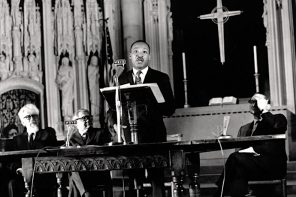For 30,000 US families, 2010 is guaranteed not to be a happy new year. Their loved ones will be deploying to our nearly decade-long war in Afghanistan. They are being sent to a war that President Obama attempted, and failed, to defend as necessary in his Nobel Peace Prize acceptance speech; a war that is set to become the strongest evidence of his failure both as Commander-in-Chief and as a peacemaker.
New private “Pentagon papers” (disclosed December 29, 2009 on The Rachel Maddow Show by journalist Richard Engel) add to a growing body of evidence that Afghanistan is another quagmire like Vietnam. Even that previous war’s chief architect, Robert McNamara, belatedly and impotently admitted it was an ill-conceived mistake. It was, like Afghanistan, an endless, poorly planned, losing war begun by one president and continued by his successors. Over the decades, Vietnam, too, faced growing opposition among the fighting ranks, as documented in the film Sir, No Sir.
Most debates about both Iraq and Afghanistan have focused on whether or not they are winnable. The president’s speech in Oslo, however, raised the bar to moral grounds. He tried to defend his decision to escalate Afghanistan by contrasting the nonviolent principles of previous Nobel laureates, Gandhi and Martin Luther King Jr., with the principles of just war that have informed the Nuremberg Principles and Geneva Conventions, the current gold standards for leaders of nations conducting wars. His defense in the abstract was eloquent. In its practical application to Afghanistan, it was shallow and inept. As Catholic social ethicist Dan Maguire noted, his defense failed all six criteria for just war, though failing only one makes a war unjust. “It is ‘a pity beyond all telling’ that the ‘just-war theory’ he invoked condemns the warring policies he anomalously defended as he accepted the Nobel Prize for Peace.”
Soldiers now deploying to both wars are denied the choice of conscience that the president articulated in accepting his Peace Prize. The rights of Conscientious Objection (CO) are currently too narrow to protect the moral conscience of soldiers. To claim this formal status, you have to show that, on religious or ethical grounds, you object to “war in any form.” This requirement denies freedom of conscience to those serving in the military who follow religious or philosophical principles of just war.
Put plainly, if you are a soldier and believe a war (such as Iraq or Afghanistan) is morally wrong, it is illegal for you to refuse to deploy—even if you believe participation implicates you in an immoral war or in war crimes. Instead, soldiers refusing to fight face sanctions, and even court martial and imprisonment.
The current situation is ethically intolerable. It is, indeed, unconscionable. With high PTSD levels, unprecedented military suicide rates, and soldiers choosing prison or desertion rather than deployment, the time for expanding religious freedom and the exercise of conscience in war has never been more urgent.
Serious moral deliberation over this matter is demanded, now more than ever. On March 21, the Truth Commission on Conscience in War, a public gathering of community and religious leaders at the Riverside Church in New York, will receive testimony from veterans and discuss religious freedom and the rights of conscience in war. The Commission will explore the consequences of current CO policies for soldiers who would willingly fight to defend our country, but cannot, in good conscience, participate in a war they believe is unjust or violates international agreements on the conduct of war, and it will launch a national conversation about expanding current CO regulations. Supporting this Commission is an opportunity for people who support the military and those in the peace movement to work together to protect moral conscience in war.
What is called “selective conscientious objection,” eloquently articulated, in principle, by President Obama, was called for during the Vietnam War and the draft, but it was denied then. Why now, you might ask, without a draft, do we need selective conscientious objection?
The reasons are many: the need for freedom of religion, international agreements on the conduct of war, motivations for military service, and backdoor drafts. The majority of religions in the United States allow participation in what Christians call “just war.” President Obama asserted that the failure of just war in World War II compelled the United Nations to create agreements such as the Nuremberg Principles and Geneva Conventions. Nuremberg Principle IV states: “The fact that a person acted pursuant to order of his Government or of a superior does not relieve him from responsibility under international law, provided a moral choice was in fact possible to him.”
Men and women volunteer for military service because they want an education, economic security, and/or a chance to serve their country. Military recruiting stations are not found in wealthy neighborhoods like Beverly Hills. But economics are not the whole story. Some sign up, as many did in World War II, because they want to fight a war they support. Lt. Ehren Watada, a college graduate, enlisted after 9/11 because he wanted to defend his country. Instead, he became the first commissioned officer to refuse deployment to Iraq—he believed ordering soldiers to fight would make him a war criminal. He volunteered to go to Afghanistan or to resign from the military. Instead he was prosecuted in military court, where he was not allowed to use his moral and legal assessment of Iraq as a defense.
National Guard troops were ordered into a war they never expected to fight. Sherburne Baker, son of Celeste Zappala, joined the Pennsylvania National Guard to serve people in his community and protect people he loved. On April 24, 2004, he became the state’s first Guardsman to die in combat since 1943, and he was killed within weeks of arriving in Iraq while searching for nonexistent weapons of mass destruction.
With an all-volunteer military asked to prosecute two wars, stop loss has become a backdoor draft. Yet some soldiers called to redeploy have come to believe that Iraq or Afghanistan is immoral or illegal. Joshua Casteel, an evangelical Republican, studied Arabic in college and enlisted after 9/11. In the documentary Soldiers of Conscience, he describes his Christian moral journey from being an interrogator at Abu Ghraib to leaving the military as a conscientious objector.
While some soldiers like Casteel have chosen a CO path since 2003, hundreds more, like Baker or Watada, cannot honestly claim to object to war in any form. Yet, they may still be morally, deeply opposed to fighting in Iraq or Afghanistan. For them, there is no court of appeals, no room for a CO just war argument; there is no way out.
When we punish soldiers who heed their moral compasses, we deny them religious freedom, and our democracy is threatened. Not only is the integrity of our military compromised; we break the moral backbone of our servicemen and women. When this happens, the international just peace community, which the president so eloquently valorized in Oslo, is weakened. And we trivialize our broader commitment to morally responsible public life.
President Obama asserted that a just peace can only last if it is grounded in the “inherent rights and dignity of every individual.” It is time our nation granted the individual women and men in the Armed Services the right of freedom of religion and conscience, the right to object to a particular war. They undertake tremendous risks and hardship to protect the nation. Let us not ask them to sacrifice their consciences to serve. Let us give them, instead, a chance to continue serving, in good conscience, the country they love.




